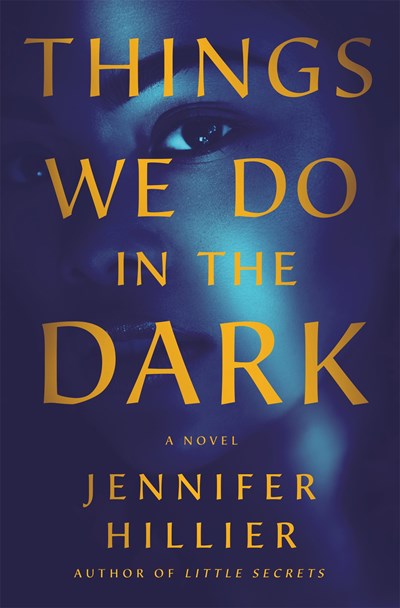Meg (as she’s currently called) knows now that she was born to be a scammer, but she didn’t always know it. It took losing her childhood home to a con artist, then living in her car and going on dates to get food, to wake her up to her dubious talents. Now she’s a pro at the long game, tricking men into letting her clean out their bank accounts before she hits the road, on to the next mark. Sometimes she hurts others along the way, such as Kat Roberts, a journalist who’s now on Meg’s tail, hoping to get revenge as well as success by breaking a high-interest story about a female con artist. But the plan isn’t as smooth as Kat hopes. Kat begins to like Meg and maybe even trust her. Adding complication, Kat’s boyfriend is also a scammer, a gambling addict who uses distractions, fake outrage, and even-more-fake promises when he’s caught, only to do it all again. Kat, and the reader, don’t know who’s at fault and whom to trust when she notices her bank statements missing and other red flags. The roller coaster story here, coupled with the fear and uncertainty endured by Kat as she learns to trust again only to be betrayed again, will stay with readers. And the facts of the various cons—this is virtually an instruction manual for fraud!—are fascinating. For those who like a story in which women fight back.
Psychological
I’m hard pressed to recall a crime novel with a more despicable group of characters yet a more compelling premise. Matthew and his husband, Charlie, lead the perfect life. Rich, well-connected, with a fabulous London flat, access to a wonderful country home, and an absolutely charming tween son, Titus, adopted by the couple after the death of Matthew’s sister. But slowly, things start to fray. Nearly always, the problems stem from Rachel, a stranger the couple met in a bookstore and whom Matthew befriended against Charlie’s instincts. Matthew invites Rachel to join their book group, giving her a wedge that she could drive into their personal life. So when the police are called and arrive to find Matthew at the dinner table stabbed to death, Charlie in shock, and Rachel holding the murder weapon—this isn’t a spoiler, trust me—we aren’t exactly surprised. What is shocking is the complex but gripping backstory that gets us to this point. This novel is very, very British. Class issues abound, class signifiers—schools, stores, real estate, and the like—are everywhere, and some things inevitably get lost in translation. But one thing remains certain: this plot will leave you twisted, and quite a bit disturbed.
Reputation is so valued that one way of damaging it, bearing false witness against your neighbor, is one of the 10 commandments. It certainly commands the life of Emma Webster, a member of Britain’s parliament who puts up with abuse online, and sometimes in person, after she takes a stand for women’s rights. Despite gaining a menacing stalker, she maintains a stiff façade and moves on with work. Then two events threaten to explode not just Emma’s reputation but her life: her teenage daughter commits a crime when seeking revenge on a bully, and a man who knows about that event is found by Emma inside her home, with injuries that see the last part of the book portraying a murder case. Underneath Vaughan’s nuanced look at the performances necessary to create and maintain a reputation, there is much to explore: the pressure that social media adds to our lives, what family members owe each other, and what women in the public eye endure. The murder trial is tense and reader opinion will vacillate numerous times among those who could have set up the crime, but they still likely won’t settle on the answer before the satisfying, surprising ending. The many fans of Vaughan’s Anatomy of a Scandal and Little Disasters won’t be disappointed.
Talk about a slow burn. If you’re a reader, like myself, who delights in a deep, deep character dive, then you’ll enjoy Ware’s latest. Oxford fresher April Clarke-Cliveden is the ultimate “It girl”—beautiful, fashionable, rich, loving but mean, a party girl yet super-smart, a staple in the pages of the Tatler. In no time she gathers around herself a constellation of friends, with her roommate Hannah Jones at the center. Life couldn’t be more delightful in their privileged, Oxbridge fantasy world, until that night when Hannah comes home to their medieval digs and finds April strangled to death. But ultimately this is Hannah’s story, and the chapters alternate between Hannah in college—building up to the murder—and her life today, ten years later. Despite a move to Edinburgh, marriage, and now pregnant, Hannah has never been able to forget April’s death and move on. When new facts emerge about April’s murder, and Hannah’s interest blossoms into full-blown obsession, she heads off to question members of their friendship circle and even to revisit Oxford and the murder scene. As the final piece of the puzzle falls into place, readers will be rewarded by a whirlwind of suspense.
Aki and Hiro have decided to break up, but before they go their separate ways they agree to spend one last night together in their Tokyo apartment. A final evening for bitter-sweet lovemaking? Not with these two, who far prefer to discuss their failed relationship, from when they first met in their university’s tennis club to their decision to split. But Aki and Hiro are engaged in far more than just reminiscing. Every chapter the book switches narrator, unearthing some profoundly unsettling facts about their relationship, stretching from their painful childhoods to the death of a guide on a mountain climbing vacation they took a year ago. Is one of them responsible for his death? A bit of a thriller, a bit of a murder mystery, and entirely compelling, this literary who-dunnit is one that readers will tear through in one sitting.
After marrying Jimmy Peralta, an old-time comedian who’s making a comeback, much younger yoga-studio owner Paris is content to live in her husband’s shadow. Then his assistant sends out a press release that includes the odd couple’s wedding photo. Paris hates life in the spotlight, and it’s turned on her full glare when the police are called to the couple’s home and find Paris with a bloodied straight razor in her hand and Jimmy dead in the tub. It’s hardly a good look for someone assumed to be a gold digger, but there’s much more to Paris’s background than she reveals. The odd romantic story here is often poignant and always unexpected, and it effectively contrasts with the much worse physical and mental treatment of Paris in her younger life, an existence that promises to end in an extreme one way or the other. It doesn’t disappoint. Hillier excels in portraying more than one woman who’s been beaten down by life and how it’s possible to react to the blows in strikingly different ways. The language here maintains a tone of low expectations shot through with hope and devastation, making this perfect for noir fans.
Dr. Laina Landers is the sort of shrink anyone would want. She’s super smart, wonderfully compassionate, and completely devoted to her patients. So when the husband of a couple she is working with holds his wife hostage at gunpoint—an incident broadcast on live TV—Laina quickly gets to the scene. She saves them both, while also meeting investigative journalist Cal Murray. Empathetic? Check. Handsome? Oh, yes. Reliable? Totally. Which comes in handy, as Laina really needs a friend/lover she can depend on as her patients are receiving deeply unsettling “presents,” like a plastic fetus in a bottle of fluid, each with the same message: Watching you. More disturbing, the gift giver is relying on knowledge about the patients that can only be found in Laina’s notes from her sessions. But who would want to destroy Laina and kill her practice in the process? As Laina and Cal search for the possible culprit, the stakes get higher as the therapist herself is targeted. The I-didn’t-see-that-coming conclusion is guaranteed to make your head explode.
What’s stranger than an eight-year-old Gretchen White standing over her murdered Aunt Rowan holding a knife dripping with blood? That child growing up to be a sociopath who works for the Boston police department and uses her access to investigate the crime, which she can’t remember. There’s a lot to learn here, and part of it is Dr. White’s lesson that her sociopathy is a neurodivergence, not a moral failing. Its core element—the inability to empathize with others—makes Gretchen an unlikely but effective psychologist, as her feelings don’t get in the way, as well as an oddly endearing villain. She’s highly aware of her emotional shortcomings, but others are too, and her vulnerability to the possible machinations of those surrounding this crime keeps the psychological twists coming. From the warped, rich family to the local woman desperate to find who murdered her sister—a separate crime that might be related to Aunt Rowan’s death—everyone’s a mess here, and everyone has motives and history that are painstakingly revealed and entwined. One for fans of Dexter and other characters we should loathe, but don’t.
On the surface, Oak Hill, New Jersey, is, yes, a perfect neighborhood. Perfect lawns, perfect homes, perfect families. A crack appears when we see local high-schooler Cassidy on a clandestine outing, running late to meet Billy, the kindergartener she babysits for when he walks home from school. He doesn’t show, and his disappearance reveals the hurt, deception, and toxic boredom lurking behind many of the tony town’s facades. Billy’s mother, Rachel, is overprotective; his father resents his younger wife for trapping him in this second marriage by becoming pregnant; his older stepbrother, a small-time drug dealer, barely acknowledges Billy. Cassidy, reviled in the papers as The Babysitter, is having an affair with a much older man. The local celebrities, has-been musician Chris and his actress wife, Allison, have just split up and she’s moved away with no explanation. As the investigation into Billy’s disappearance continues, his shattered family is the nexus of a town in turmoil, allowing Alterman to show how pressure and desperation can manifest in very different ways and result in vastly different outcomes. Billy’s disappearance isn’t the only crime, and the interpersonal stories as well as the crime-centered mysteries will keep readers shaking their heads in disbelief as they keep the pages turning, hoping for justice.
Goldin’s (The Night Swim) startling work immerses readers in the disorientation and vulnerability that is amnesia. Every time Liv Reese wakes up, she has no memory of the previous two years. Notes that she writes on her hands and Post-its on her doors and walls guide her to contact friends who can help and to find the precious journal that details each vanished day. She repeatedly learns afresh that she was injured two years ago, leading to her memory problems, while other terrible events from that time are slowly revealed. In the present, the awakening that opens the book sees her running from an apartment with a bloody knife. Did she hurt someone? Whose apartment was that? Why does it seem like a different season? Then the point of view switches to a dead body being found, and a chase is on that sees us switching back and forth in time from before the injury, when Liv was a nightlife-loving young New Yorker who worked at a high-status magazine, to a few days before the bloody-knife incident, when the past catches up to her with a vengeance. The displacement caused to Liv by her condition is visited on readers to fast-paced and thought-provoking effect here; the story is gripping too, all adding up to a top-shelf psychological thriller for fans of Alice LaPlante.










